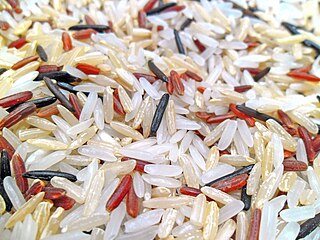
Rice is the seed of the grass species Oryza sativa or less commonly Oryza glaberrima. The name wild rice is usually used for species of the genera Zizania and Porteresia, both wild and domesticated, although the term may also be used for primitive or uncultivated varieties of Oryza.

Fair trade is an arrangement designed to help producers in growing countries achieve sustainable and equitable trade relationships. The fair trade movement combines the payment of higher prices to exporters with improved social and environmental standards. The movement focuses in particular on commodities, or products that are typically exported from developing countries to developed countries, but is also used in domestic markets, most notably for handicrafts, coffee, cocoa, wine, sugar, fruit, flowers, and gold.
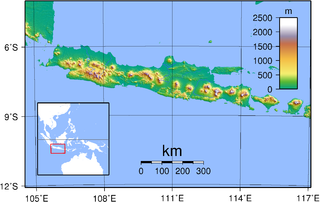
Java is one of the Greater Sunda Islands in Indonesia. It is bordered by the Indian Ocean to the south and the Java Sea to the north. With a population of 147.7 million people, Java is the world's most populous island, constituting approximately 55% of the Indonesian population.
Dumping, in economics, is a kind of injuring pricing, especially in the context of international trade. It occurs when manufacturers export a product to another country at a price below the normal price with an injuring effect. The objective of dumping is to increase market share in a foreign market by driving out competition and thereby create a monopoly situation where the exporter will be able to unilaterally dictate price and quality of the product.
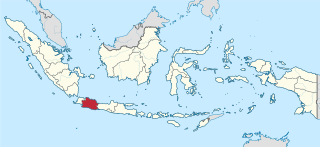
West Java is a province of Indonesia on the western part of the island of Java, with its provincial capital in Bandung. West Java is bordered by the province of Banten and the country's capital region of Jakarta to the west, the Java Sea to the north, the province of Central Java to the east and the Indian Ocean to the south. With Banten, this province is the native homeland of the Sundanese people, the second-largest ethnic group in Indonesia.

Organic certification is a certification process for producers of organic food and other organic agricultural products, in the European Union more commonly known as ecological or biological products. In general, any business directly involved in food production can be certified, including seed suppliers, farmers, food processors, retailers and restaurants. A lesser known counterpart is certification for organic textiles that includes certification of textile products made from organically grown fibres.

A paddy field is a flooded field of arable land used for growing semiaquatic crops, most notably rice and taro. It originates from the Neolithic rice-farming cultures of the Yangtze River basin in southern China, associated with pre-Austronesian and Hmong-Mien cultures. It was spread in prehistoric times by the expansion of Austronesian peoples to Island Southeast Asia, Southeast Asia including Northeastern India, Madagascar, Melanesia, Micronesia, and Polynesia. The technology was also acquired by other cultures in mainland Asia for rice farming, spreading to East Asia, Mainland Southeast Asia, and South Asia.

Basmati, pronounced ['bɑːsmət̪iː], is a variety of long, slender-grained aromatic rice which is traditionally grown in India, Pakistan, and Nepal. As of 2019, India accounted for 65% of the international trade in basmati rice, while Pakistan accounted for the remaining 35%. Many countries use domestically grown basmati rice crops; however, basmati is geographically exclusive to certain districts of India and Pakistan.

Agriculture in Thailand is highly competitive, diversified and specialized and its exports are very successful internationally. Rice is the country's most important crop, with some 60 percent of Thailand's 13 million farmers growing it on fully half of Thailand's cultivated land. Thailand is a major exporter in the world rice market. Rice exports in 2014 amounted to 1.3 percent of GDP. Agricultural production as a whole accounts for an estimated 9-10.5 percent of Thai GDP. Forty percent of the population work in agriculture-related jobs. The farmland they work was valued at US$2,945 per rai in 2013. Most Thai farmers own fewer than eight hectares of land.
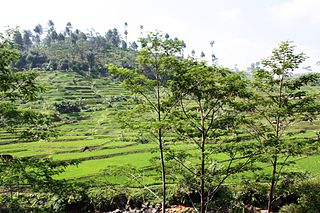
Tasikmalaya Regency is a regency in the province of West Java, Indonesia. It covers an area of 2,708.82 km2, and had a population of 1,687,776 at the 2010 Census, which rose to 1,865,203 at the 2020 Census. Located in the southeastern region of Priangan (Preanger), the Regency is by far the biggest and the most important regency in East Preanger. The Regency was previously administered from Tasikmalaya City, which however is now administratively independent of the Regency, and the administrative centre of the Regency is now at Singaparna to the west of the city.
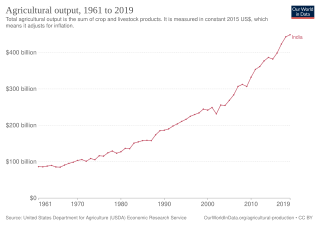
The history of agriculture in India dates back to the Indus Valley Civilization. India ranks second worldwide in farm outputs. As per 2018, agriculture employed more than 50% of the Indian work force and contributed 17–18% to country's GDP.
The Oromia Coffee Farmers’ Cooperative Union (OCFCU) is a smallholder farmer owned cooperative union based in the Oromia region of south, central and west Ethiopia. Coffee accounts for approximately thirty-two percent of the value of all merchandise exports and Oromia accounts for more than sixty-five percent of the country’s total coffee growing lands. Furthermore, Oromia is the region where coffee first originated. The region is characterised by its unique native vegetation and tropical climate conducive to coffee bean growth. OCFCU is a democratic, member’s owned business operating under principles of International Cooperative Alliance and Fair trade and the Union plays a central role in the Ethiopian coffee marketing chain. The members of OCFCU grow, process and supply organic Arabica coffee for export.

Organic coffee is coffee produced without the aid of artificial chemical substances, such as certain additives or some pesticides and herbicides.

The primary form of agriculture in Sri Lanka is rice production. Rice is cultivated during Maha and Yala seasons. Tea is cultivated in the central highlands and is a major source of foreign exchange. Vegetables, fruits and oilseed crops are also cultivated in the country. There are two Agriculture Parks abbreviated as A. Parks established by the Department of Agriculture. Out of the total population in Sri Lanka, 27.1% engages in agricultural activities. Agriculture accounted for 7.4% of the GDP in 2020.

Agriculture is one of the key sectors within the Indonesian economy. In the last 50 years, the sector's share in national gross domestic product has decreased considerably, due to the rise of industrialisation and service sector. Nevertheless, for the majority of Indonesian households, farming and plantation remains as a vital income generator. In 2013, the agricultural sector contributed 14.43% to national GDP, a slight decline from 2003's contribution which was 15.19%. In 2012, the agricultural sector provides jobs to approximately 49 million Indonesians, representing 41% of the country's total labor force.

Indonesia was the fourth-largest producer of coffee in the world in 2014. Coffee cultivation in Indonesia began in the late 1600s and early 1700s, in the early Dutch colonial period, and has played an important part in the growth of the country. Indonesia is geographically and climatologically well-suited for coffee plantations, near the equator and with numerous interior mountainous regions on its main islands, creating well-suited microclimates for the growth and production of coffee.
The Specialty Coffee Association of Indonesia (SCAI) is a trade association that represents stakeholders of Indonesia coffee Industry . The organization was founded in 2007 and as of October 2020 have more than 800 active members. "Excellence in Diversity" is the motto for SCAI, due to the facts Indonesia may have the most variety of coffee in the world and also representing its members that comes from very diverse background but shares same idealism on how to develop Indonesia coffee industry.

Rice production in Thailand represents a significant portion of the Thai economy and labor force. In 2017, the value of all Thai rice traded was 174.5 billion baht, about 12.9% of all farm production. Of the 40% of Thais who work in agriculture, 16 million of them are rice farmers by one estimate.

Fair trade cocoa is an agricultural product harvested from a cocoa tree using a certified process which is followed by cocoa farmers, buyers, and chocolate manufacturers, and is designed to create sustainable incomes for farmers and their families. Companies that use fair trade certified cocoa to create products can advertise that they are contributing to social, economic, and environmental sustainability in agriculture.
Slow Flowers is a movement promoting the support and purchase of American-grown flowers in the United States. Similar to the Slow Food movement—aimed at preserving local, sustainable food and traditional cooking—Slow Flowers encourages consumers to support their local economy and consciously purchase cut flowers grown locally, seasonally and ethically in the United States, instead of purchasing flowers imported from other countries or flowers grown using chemicals and pesticides. The philosophy behind slow flowers is part of the wider slow movement. The Slow Flowers Community was founded by author and writer Debra Prinzing in 2014 after she authored a book titled Slow Flowers, in which the term "slow flowers movement" was coined, and the movement has since spread internationally.















